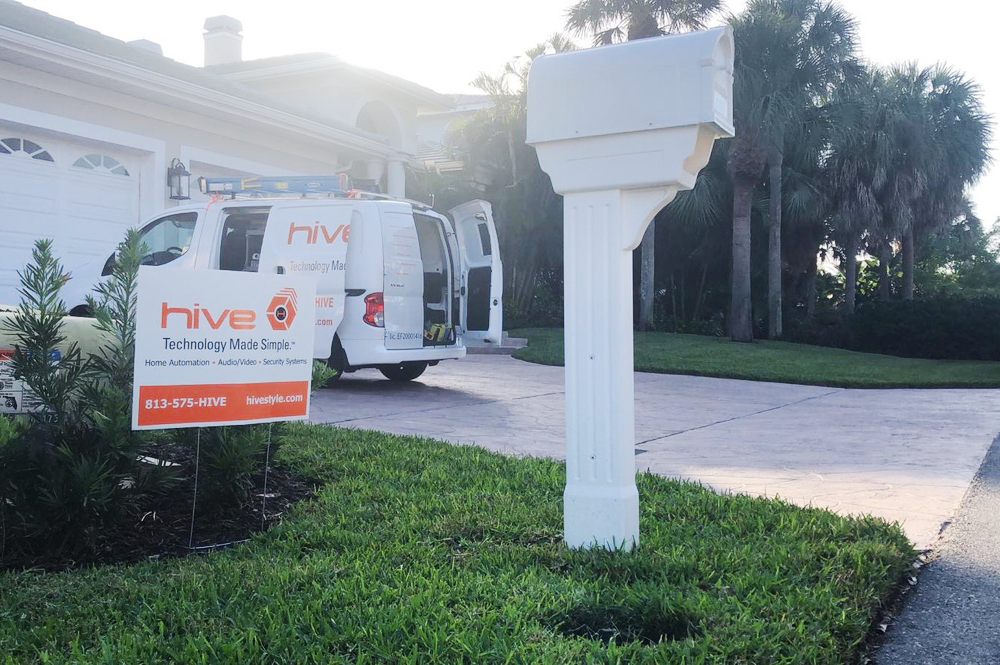

In the age of Do-It-Yourself, it seems anyone can become an expert on anything. People are undertaking new hobbies every day from homemade crafts to building cars. Many modern homeowners are implementing smart home technology to improve their space and lives. But what’s the difference between having a smart device and a smart home? And is it smart (pun intended) to install all these devices yourself?
At Hive, a premier home automation company in Tampa, we’ve installed hundreds of home automation systems, big and small, over the years. While it might be tempting to hook everything over the internet to your Alexa, some things should be left to the professionals.
In this article, we break down five reasons not to DIY your smart home automation.
How complex of a system do you want? Are you connected with a few lights connected to an Alexa or Google Home? Would you like a fully automated home where you can control everything with a few clicks?
Automating a single room and a whole two-story house have vastly different price points and labor. Consider how many devices you want to add. Entire home automations can include wireless access points, automated shades, audio, a security system, lights, an entertainment area, and so much more.
Even deciding your smart hub can be a doozy. If you’re thinking about voice control, are you looking to connect to an established Alexa or Google Home? Or you could step up your system with the high-tech Josh Ai. Most systems, like Control4, connect to a central tablet or smartphone app, which allows you to control your system remotely.
Call a design consultant and work through your dream list together. A professional will be able to help you break down what products are best, where in the home you'd like your devices, and how best to control everything.
Not every DIY system is safe. Installing a smart home system professionally is important to ensure your network is secure and updated frequently to reduce any security issues. If your device connects over the internet, there may be vulnerabilities.
Hardwiring your system into the network versus using a wireless connection can improve your safety significantly. You can read more about the benefits of hardwiring in our previous blog Hardwired versus Wireless. It’s important not only to select the right devices but to make sure your connected devices aren’t vulnerable to hacking or other compromises.
Smart home systems like Control4 are dedicated to improving your home automation experience but don’t sell user data. By using a professional dealer, you can ensure that there are minimal gaps in your security and keep your information safe.
One of the biggest issues when creating a DIY system is system compatibility. Different manufacturers often have unique programming, with little to no compatibility with other software. Thus, this can lead to a homeowner having multiple remotes or apps to handle even the simplest tasks.
When you undergo professional home automation, your dealer is guaranteed to work with reputable brands, with the knowledge of how to connect the devices seamlessly. Consulting a professional or researching products under the same brand is the best way to go for planning an extensive home automation project.
Another issue of using a variety of equipment can be maintaining it all. Like all technology, new software becomes available as bugs are fixed and improvements are made. When one device goes down, will you be able to troubleshoot the issue?
There are some programming issues that can be solved on your own, but many require the assistance of a professional technician. This could be because of a wiring issue, connectivity issues, or the device needing to be replaced.
A seasoned technician is more likely to fix your situation much faster and can help with routine maintenance. They’ll also be able to teach you the intricacies of your system, and how to repair some hiccups should they arise.
Many people don’t realize that automating your home takes a lot of labor. Not only does the homeowner have to undertake an immense amount of research, but there’s also a strain on the body. Oftentimes hardwiring is required to connect certain devices. As discussed above, connecting all your devices over Wi-Fi can result in a thin and unsecured network. More complex wiring requires the ability to crawl through small spaces like attics.
Instead of spending your day on ladders, mounting cameras, and wiring lights, hire a professional technician to install your system. Not only will they handle all the heavy lifting, but they’ll ensure that your system is set up properly. Thus, there’s no need to keep reconnecting devices or switching out parts along the way.
Having a professional installer will ensure your home automation system is secure, safe, and convenient. No matter the size of your home, you deserve a reliable system. When planning your smart home system arrange a design consultation with a seasoned pro. They’ll be able to provide price estimates for the equipment and labor, show you the best places to begin the installation, and get you started on your dream smart home.
Have any questions? Reach out to Hive by calling (813) 575-HIVE or reach out through our contact page for more information. Our free consultation service will connect you with a professional designer and get you on the right track to your better home! Check out more installations behind-the-scenes on our Youtube Channel.